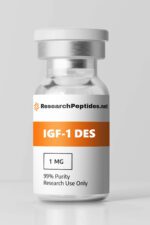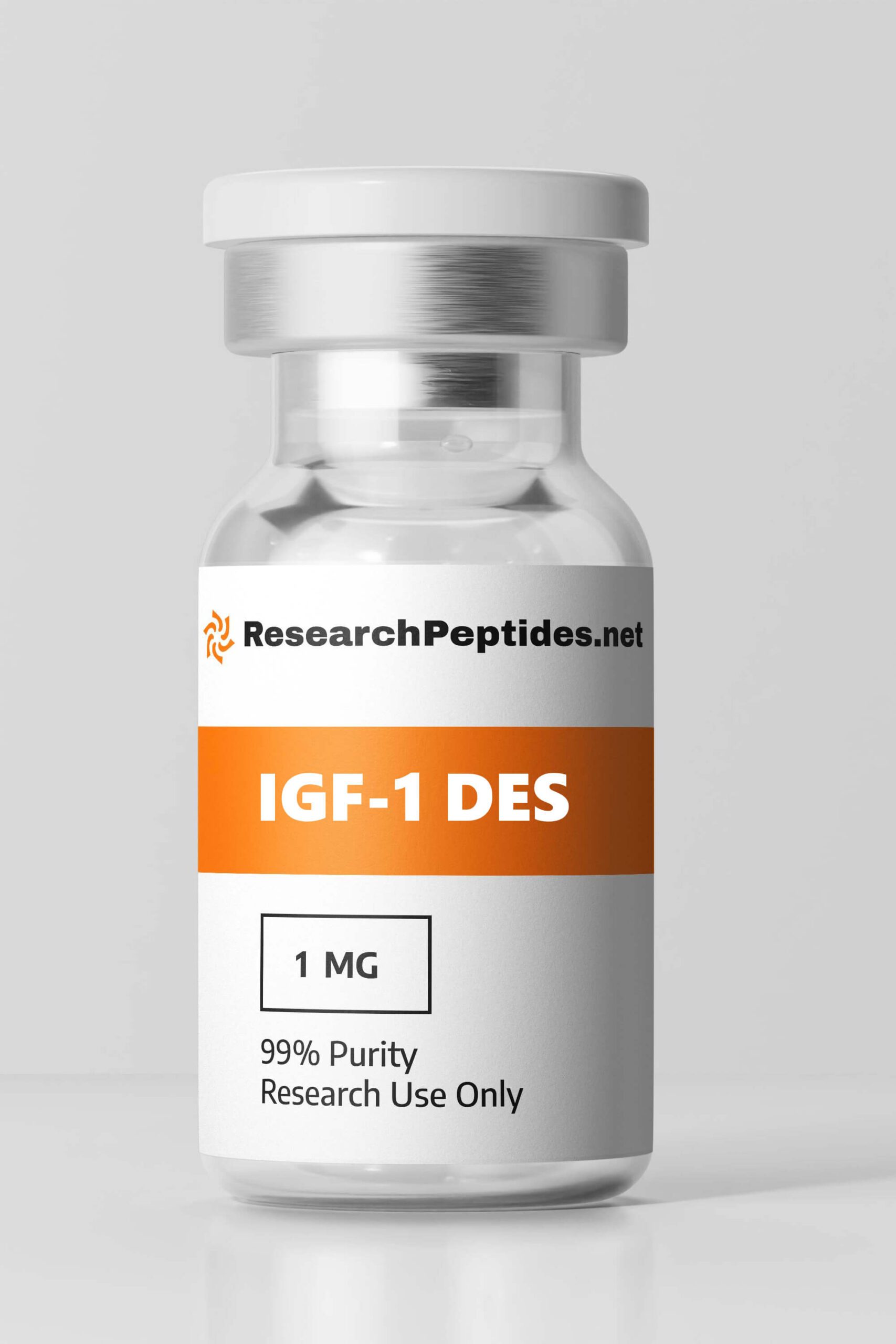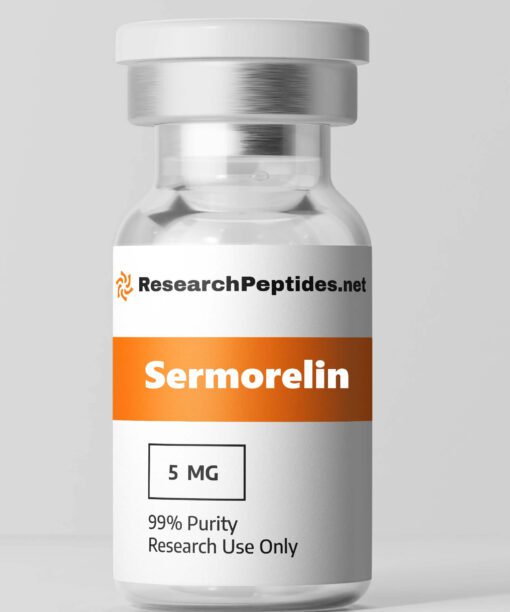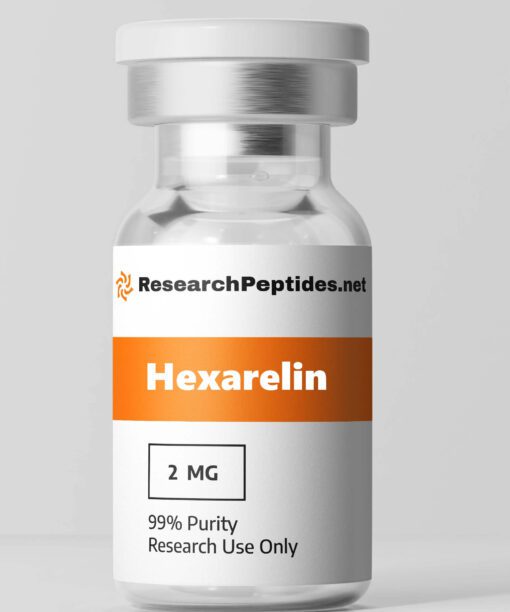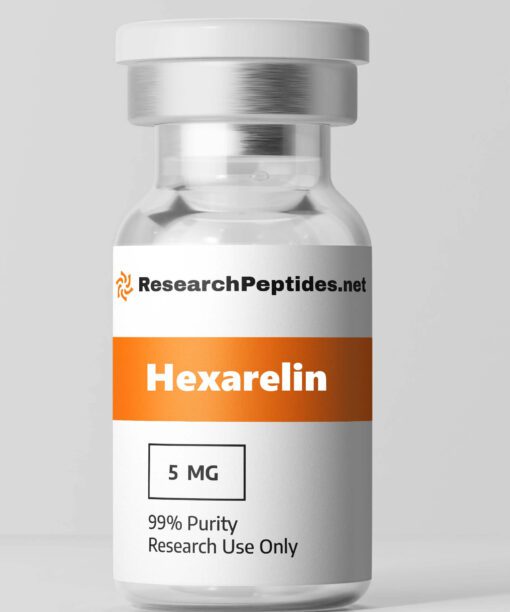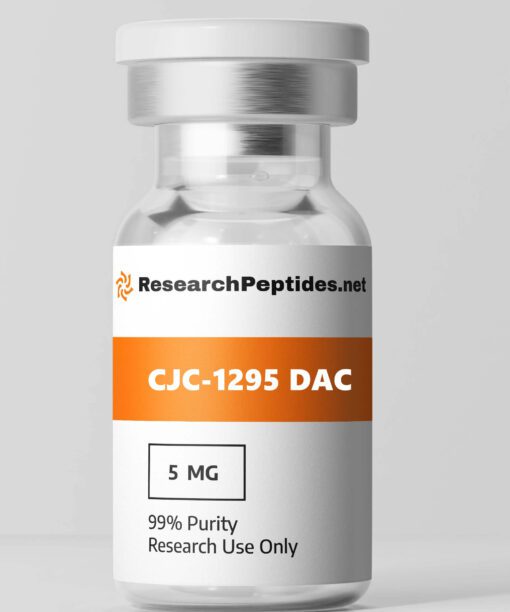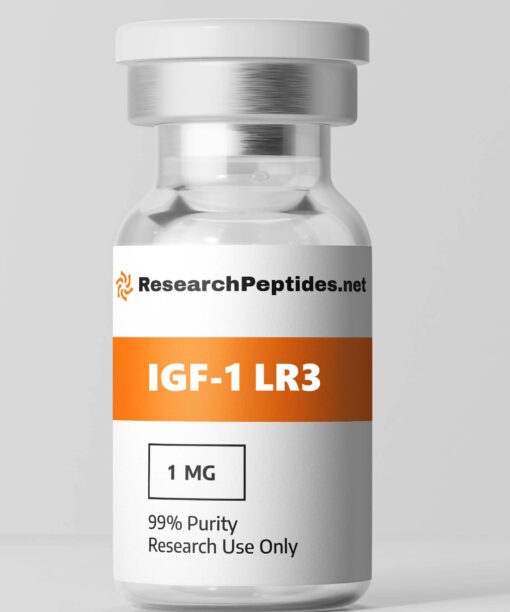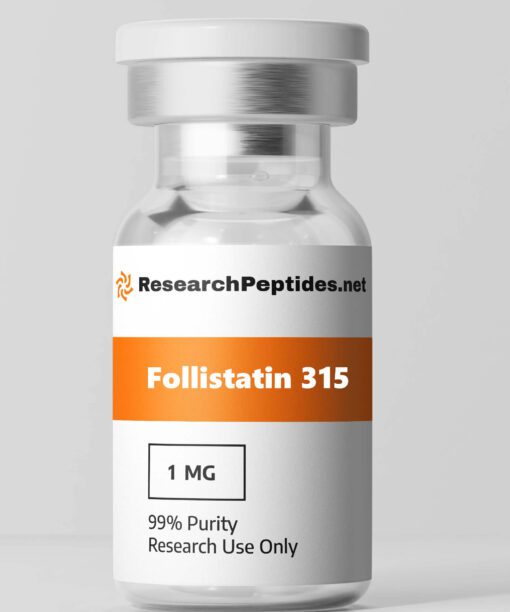Unlocking the Potential of IGF-1 DES: Unveiling its Promising Role in Enhancing Muscle Growth and Recovery
Introducing IGF-1 DES: A Promising Research Product with Proven Benefits!
IGF-1 DES, backed by extensive studies, has emerged as a groundbreaking research product with remarkable potential. Studies have shown its ability to enhance muscle growth, improve recovery time, and promote overall well-being. With its proven benefits, IGF-1 DES is set to revolutionize the field of scientific research and open new avenues for advancements in human health.
1. What is IGF-1 DES?
IGF-1 DES, also known as Insulin-like Growth Factor-1 Des(1-3), is a synthetic peptide that is derived from the naturally occurring IGF-1 hormone. It has been modified to have a shorter amino acid chain, consisting of only 67 amino acids compared to the full-length IGF-1 which contains 70 amino acids. This modification allows IGF-1 DES to have a higher potency and more localized effects.
IGF-1 DES is a member of the insulin-like growth factor family, which plays a crucial role in regulating cell growth, proliferation, and differentiation. It acts as a mediator of the effects of growth hormone (GH) and stimulates the growth and development of various tissues in the body.
Compared to other forms of IGF-1, such as IGF-1 LR3 (Long R3 Insulin-like Growth Factor-1), IGF-1 DES has a shorter half-life and exhibits more potent anabolic effects. While both forms promote muscle growth and protein synthesis, IGF-1 DES has been shown to have stronger tissue-building properties due to its increased affinity for binding with receptors in target tissues.
2. How Does IGF-1 DES Work?
The mechanism of action of IGF-1 DES involves its interaction with insulin receptors and various growth factors. When administered, it binds to insulin receptors present on the surface of cells, activating intracellular signaling pathways that promote cell growth and survival.
IGF-1 DES also interacts with other proteins in the body known as insulin-like growth factor-binding proteins (IGFBPs). These proteins regulate the availability and activity of IGF-1 by binding to it and modulating its effects. By binding to IGFBPs, IGF-1 DES can bypass their inhibitory actions and exert its anabolic effects more effectively.
Furthermore, IGF-1 DES has been shown to stimulate the production of other growth factors, such as fibroblast growth factor (FGF) and vascular endothelial growth factor (VEGF), which play important roles in tissue repair and angiogenesis. These additional mechanisms contribute to the overall regenerative properties of IGF-1 DES.
3. IGF-1 DES Benefits
In non-human research studies, IGF-1 DES has demonstrated several potential benefits:
- Increased muscle growth: IGF-1 DES has been shown to promote muscle hypertrophy by stimulating protein synthesis and inhibiting protein breakdown. This leads to an overall increase in muscle mass and strength.
- Enhanced recovery: Due to its regenerative properties, IGF-1 DES may accelerate the healing process of injured tissues, such as muscles or tendons. It can help reduce recovery time between workouts or injuries.
- Promotion of cartilage regeneration: Studies have suggested that IGF-1 DES may have a positive effect on cartilage regeneration, making it potentially beneficial for conditions such as osteoarthritis or joint injuries.
- Improved bone density: Research indicates that IGF-1 DES may play a role in increasing bone mineral density and promoting bone health.
4. IGF-1 DES Side Effects
In non-human research studies, some potential side effects of IGF-1 DES have been observed:
- Impact on glucose metabolism: IGF-1 DES has been shown to affect glucose metabolism by decreasing insulin sensitivity and impairing glucose uptake. This can potentially lead to issues with blood sugar regulation.
- Potential for hypoglycemia: Due to its effects on glucose metabolism, IGF-1 DES may increase the risk of hypoglycemia (low blood sugar) if not properly monitored.
- Joint pain: Some studies have reported joint pain as a side effect of IGF-1 DES use. This may be due to its effects on cartilage regeneration or other factors.
5. Advantages of IGF-1 DES
IGF-1 DES offers several advantages that set it apart from other peptides:
- Increased potency: Due to its shorter amino acid chain, IGF-1 DES has a higher potency and greater affinity for binding with receptors in target tissues compared to full-length IGF-1 or other forms of IGF-1.
- Localized effects: The shorter half-life of IGF-1 DES allows for more localized effects in the target tissues, minimizing potential systemic side effects.
- Promotion of tissue repair: The regenerative properties of IGF-1 DES make it particularly beneficial for tissue repair and recovery after injury or intense physical activity.
6. IGF-1 DES Research Topics
The current research involving IGF-1 DES in non-human studies covers various areas, including:
- Bone density: Investigating the effects of IGF-1 DES on bone mineral density and its potential for improving bone health.
- Cartilage regeneration: Exploring the ability of IGF-1 DES to promote cartilage regeneration and its potential applications in treating joint injuries or degenerative conditions like osteoarthritis.
- Muscle growth and protein synthesis: Studying the mechanisms by which IGF-1 DES promotes muscle hypertrophy and protein synthesis, with a focus on optimizing dosing protocols and combinations with other compounds.
7. Future Research Directions for IGF-1 DES
Potential areas for further investigation in non-human research involving IGF-1 DES include:
- Combination therapies: Exploring the synergistic effects of combining IGF-1 DES with other peptides or compounds to maximize its anabolic and regenerative properties.
- Tissue-specific targeting: Investigating ways to enhance the localized effects of IGF-1 DES in specific tissues, such as muscles or joints, while minimizing systemic side effects.
- Long-term safety and efficacy: Conducting studies to assess the long-term safety profile and effectiveness of IGF-1 DES use in non-human models, including potential impacts on overall health and lifespan.
8. IGF-1 DES Before and After Research
In non-human studies, examples showcasing the effects of IGF-1 DES before and after treatment have demonstrated significant changes in muscle mass, tissue repair, and overall physical performance. These changes can be visually observed or measured using various techniques, such as:
- Body composition analysis: Measurements of muscle mass, fat mass, and overall body weight can provide quantitative data on the effects of IGF-1 DES on body composition.
- Histological analysis: Examination of tissue samples under a microscope can reveal changes in muscle fiber size, collagen deposition, and other indicators of tissue repair and growth.
- Functional performance tests: Assessments of physical performance, such as strength tests or endurance exercises, can demonstrate improvements in muscle function and athletic abilities.
9. IGF-1 DES Cycle for Research
In non-human studies using IGF-1 DES, a recommended dosing schedule typically involves:
- Dosing frequency: IGF-1 DES is usually administered multiple times per day to maintain stable blood levels. The exact frequency may vary depending on the specific research protocol.
- Cycle duration: Research cycles with IGF-1 DES often last for several weeks to allow sufficient time for observing the effects and potential adaptations in the target tissues.
- Dose optimization: Initial doses are typically lower and gradually increased over time to assess individual response and tolerance. The optimal dose may vary depending on the research objectives and animal model used.
10. Best IGF-1 DES Results in Research
To achieve the best results with IGF-1 DES in non-human research studies, several factors should be considered:
- Dosage optimization: Finding the optimal dose for the specific research objectives and animal model used is crucial. This may require gradually increasing the dose and monitoring the response closely.
- Proper administration: Following a consistent dosing schedule and ensuring accurate administration of IGF-1 DES is essential for obtaining reliable results.
- Combination with other compounds: Exploring potential synergistic effects by combining IGF-1 DES with other peptides or compounds may enhance its anabolic and regenerative properties.
- Monitoring and evaluation: Regularly assessing the effects of IGF-1 DES through measurements, functional tests, or histological analysis allows for better understanding of its impact on target tissues.
11. Where to Buy IGF-1 DES?
When looking to purchase IGF-1 DES, it is important to choose a reputable supplier that offers high-quality products. ResearchPeptides is a trusted source for buying peptides, including IGF-1 DES. They provide peptides that undergo rigorous testing to ensure purity and potency.
12. IGF-1 DES for Sale
If you are interested in purchasing IGF-1 DES from Research Peptides, you can visit their website at www.researchpeptides.net. They offer competitive pricing, secure online ordering, and worldwide shipping options to ensure convenient access to their products.
Based on extensive research, IGF-1 DES has demonstrated remarkable potential in various areas of human health. Studies have consistently shown its ability to enhance muscle growth, improve recovery time, and promote overall well-being. With its promising effects on tissue repair and metabolism, IGF-1 DES holds great promise as a valuable tool for athletes, patients undergoing rehabilitation, and individuals seeking to optimize their physical performance.
Frequently Asked Questions About IGF-1 DES Peptides April 2024
How much IGF-1 should I take?
IGF-I is authorized for use in patients who have severe IGF-I deficiency or GH gene deletion and have developed antibodies to GH. The recommended dosage is 40-120 μg/kg given twice daily through subcutaneous injection.
Does creatine boost IGF-1?
In a research study, participants who were in good health took creatine daily for a period of 5 days. The results showed a significant increase of 30% in IGF expression.
How to use IGF-1 des for bodybuilding?
For days when exercising, the injection should be given before and after the workout. On days when not exercising, it can be given at any time. It is strongly advised to administer it at the same time every day. The typical duration of a dosage cycle is 2 to 12 weeks.
What hormone stops muscle growth?
Anabolic hormones promote muscle growth by using energy to build larger molecules from smaller ones, while catabolic hormones, like cortisol, have the opposite effect by breaking down molecules to release energy, inhibiting muscle growth.
What is the difference between IGF-1 and IGF-1 des?
Des(1-3)IGF-I is typically around 10 times more effective than IGF-I in promoting the growth and multiplication of cultured cells. This is because it has a much lower affinity for IGF-binding proteins, which is due to the absence of glutamate at position 3.
Is IGF-1 safe to take?
IGF can have harmful effects, such as inflammation in the retina, which is responsible for transmitting visual signals to the brain. It can also lead to intense muscle and joint discomfort, as well as Bell’s palsy, a condition characterized by facial weakness and drooping on one side, resembling a stroke.
Discover the Power of Peptides: Your Ultimate Resource 2024
Explore a wide range of peptide forms including amino acid polymers, combined peptides, IGF-1 Proteins, Melanotan compounds, and skincare peptides at our US Peptides Shop. Dive deeper into peptide science with our Buy Research Peptides platform. We also provide a selection of Laboratory apparatus for your research needs. Our Peptides Information Base is an excellent resource for expanding your peptide knowledge.
Author Info and References
Author Info
The information provided in this article was taken from studies carried out by recognized researchers, including Y. Pang, B. Zheng, L. Campbell, L. Fan, Z. Cai, P. Rhodes, C. Mitsiades, N. Mitsiades, V. Poulaki, R. Schlossman, M. Akiyama, D. Chauhan, T. Hideshima, S. Treon, Nikhil C. Munshi, P. Richardson, K. Anderson, M. K. Lingohr, L. M. Dickson, J. McCuaig, S. Hügl, D. Twardzik, C. Rhodes, Mathilde Solyga, and F. Solari.
References
- Pang, Y., Zheng, B., Campbell, L., Fan, L., Cai, Z., & Rhodes, P. (2010). IGF-1 Can Either Protect Against or Increase LPS-Induced Damage in the Developing Rat Brain. Pediatric Research. https://dx.doi.org/10.1203/PDR.0b013e3181dc240f
- Mitsiades, C., Mitsiades, N., Poulaki, V., Schlossman, R., Akiyama, M., Chauhan, D., Hideshima, T., Treon, S. P., Munshi, N. C., Richardson, P. G., & Anderson, K. C. (2002). Activation of NF-κB and upregulation of intracellular anti-apoptotic proteins via the IGF-1/Akt signaling in human multiple myeloma cells: therapeutic implications. Oncogene. https://dx.doi.org/10.1038/sj.onc.1205664
- Lingohr, M. K., Dickson, L. M., McCuaig, J., Hügl, S., Twardzik, D., & Rhodes, C. J. (2002). Activation of IRS-2—Mediated Signal Transduction by IGF-1, but not TGF-α or EGF, Augments Pancreatic β-Cell Proliferation. Diabetes. https://dx.doi.org/10.2337/DIABETES.51.4.966
- Solyga, M., & Solari, F. (2020). La voie de signalisation du récepteur DAF-2 (Insuline/IGF-1) : un acteur clé du vieillissement musculaire. Médecine/Sciences. https://dx.doi.org/10.1051/medsci/2020166
IGF1 DES Research Peptides Scientists
Share The IGF-1 DES Product Page
Product Usage: THIS PRODUCT IS INTENDED AS A RESEARCH CHEMICAL ONLY. This designation allows the use of research chemicals strictly for in vitro testing and laboratory experimentation only. All product information available on this website is for educational purposes only. This product has not been approved by the FDA for Human Use. Bodily introduction of any kind into humans or animals is strictly forbidden by law. This product should only be handled by licensed, qualified professionals. This product is not a drug, food, or cosmetic and may not be misbranded, misused or mislabeled as a drug, food or cosmetic.
Estimated Reading Time: 13 min read

